
Lucinda Gayl Williams is an American singer-songwriter and a solo guitarist. She recorded her first two albums, Ramblin' on My Mind (1979) and Happy Woman Blues (1980), in a traditional country and blues style that received critical praise but little public or radio attention. In 1988, she released her third album, Lucinda Williams, to widespread critical acclaim. Regarded as "an Americana classic", the album also features "Passionate Kisses", a song later recorded by Mary Chapin Carpenter for her 1992 album Come On Come On, which garnered Williams her first Grammy Award for Best Country Song in 1994. Known for working slowly, Williams released her fourth album, Sweet Old World, four years later in 1992. Sweet Old World was met with further critical acclaim and was voted the 11th best album of 1992 in The Village Voice's Pazz & Jop, an annual poll of prominent music critics. Robert Christgau, the poll's creator, ranked it 6th on his own year-end list, later writing that the album as well as Lucinda Williams were "gorgeous, flawless, brilliant".

Car Wheels on a Gravel Road is the fifth studio album by American singer-songwriter Lucinda Williams, released on June 30, 1998, by Mercury Records. The album was recorded and co-produced by Williams in Nashville, Tennessee and Canoga Park, California, and features guest appearances by Steve Earle and Emmylou Harris.

Hello is the debut album by the American singer-songwriter Poe. It was released in 1995 on Modern Records.

Essence is the sixth studio album by American singer-songwriter Lucinda Williams, released on June 5, 2001, by Lost Highway Records. The album debuted on the Billboard 200 at No. 28, selling approximately 44,500 copies in its first week. By 2008, it had sold 336,000 copies in the U.S.
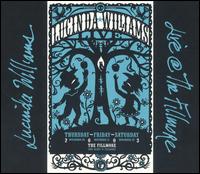
Live at the Fillmore is a live album by American singer-songwriter Lucinda Williams, her eighth album overall, released on May 10, 2005, by Lost Highway Records.
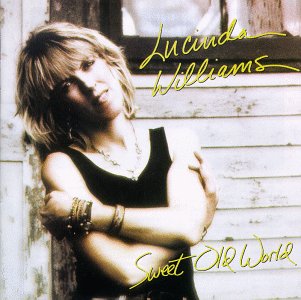
Sweet Old World is the fourth studio album by American singer-songwriter Lucinda Williams, released on August 25, 1992, by Chameleon Records.

Lucinda Williams is the third studio album by American singer-songwriter Lucinda Williams, released in 1988, by Rough Trade Records.
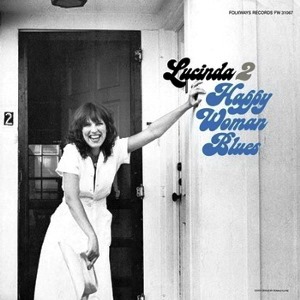
Happy Woman Blues is the second studio album by American singer-songwriter Lucinda Williams, released in 1980 by Smithsonian Folkways.
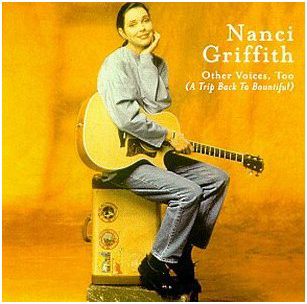
Other Voices, Too is a 1998 album by Nanci Griffith. It is her thirteenth studio album. Following the Grammy Award-winning album Other Voices, Other Rooms, Other Voices, Too is a second album of cover songs written by a wide variety of singer-songwriters.
"Worried Man Blues" is a folk song in the roots music repertoire. It is catalogued as Roud Folk Song Index No. 4753. Like many folk songs passed by oral tradition, the lyrics vary from version to version, but generally all contain the chorus "It takes a worried man to sing a worried song/It takes a worried man to sing a worried song/I'm worried now, but I won't be worried long." The verses tell the story of a man imprisoned for unknown reasons "I went across the river, and I lay down to sleep/When I woke up, had shackles on my feet", who pines for his lost love, who is "on the train and gone."
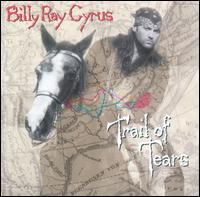
Trail of Tears is the fourth studio album from country artist Billy Ray Cyrus. It was released on August 20, 1996, and two singles were released: the title track and "Three Little Words", which respectively peaked at number 69 and number 65 on the country charts.

Interpreter is the thirteenth solo studio album, and twentieth album overall by English rock musician Julian Cope, released by Echo Records in October 1996. Particularly inspired by Cope's involvement with the Newbury bypass protest, the record features socially and environmentally-concerned lyrics. The musician worked with numerous guest musicians, including substantial contributions from Thighpaulsandra, resulting in a sprawling album that extends the pop style of 20 Mothers (1995) while incorporating styles of glam pop, space rock, orchestral pop, with string arrangements and electronic overtones. The record is split into two separate parts, "Phase 1" and "Phase 2".

"It's Nobody's Fault but Mine" or "Nobody's Fault but Mine" is a song first recorded by gospel blues artist Blind Willie Johnson in 1927. It is a solo performance with Johnson singing and playing slide guitar. The song has been interpreted and recorded by numerous musicians in a variety of styles, including Led Zeppelin on their 1976 album Presence.

Ramblin' Fever is a studio album by American country music singer Merle Haggard, released in 1977. It was his first on the MCA label after recording for Capitol Records since 1965. It was also his first album without crediting the Strangers. It reached Number 5 on the Country album chart. Ramblin' Fever was reissued on CD in 2002.

Down Where the Spirit Meets the Bone is the 11th studio album by American singer-songwriter Lucinda Williams. The double album was released on September 30, 2014. It is the first album on Williams' own Highway 20 Records label. The song "Compassion", from which the album title is derived, is based on a poem by her father, Miller Williams.
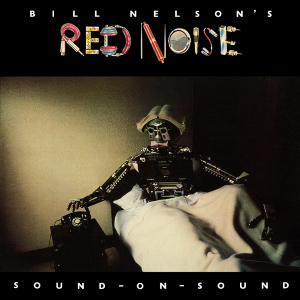
Sound-on-Sound is the sole album by English new wave band Bill Nelson's Red Noise, released in February 1979 by record label Harvest. Band leader Bill Nelson formed the group after the disbandment of Be-Bop Deluxe in 1978. The record was recorded with producer and engineer John Leckie, and marks a stylistic change for Nelson with its emphasis on synthesizers. His lyrics were inspired by science fiction and dystopian themes, which the musician tried to present in a humorous way. The album cover, featuring a bed-ridden robot, was photographed by Bishin Jumonji

The Ghosts of Highway 20 is the 12th studio album by American singer-songwriter Lucinda Williams. The double album was released on February 5, 2016, by Highway 20 Records. It was nominated for the Americana Music Award for Album of the Year.

Everywhere at Once is the second studio album and major-label debut by American power pop band the Plimsouls, released in 1983 by Geffen Records. The album reached #186 on the Billboard albums chart. It includes the radio hit "A Million Miles Away" which reached #11 on Billboard's Top Rock Tracks. It would be the band's last album until 1998's Kool Trash.

Vanished Gardens is a studio album made in collaboration between jazz saxophonist Charles Lloyd, the backing band The Marvels, and roots music singer-songwriter Lucinda Williams, released on June 29, 2018, by Blue Note Records. The album has received positive critical reception.

The discography of Lucinda Williams, an American singer, songwriter, and musician, consists of 15 studio albums, one live album, two video albums, and 25 singles, on Folkways Records, Smithsonian Folkways, Rough Trade Records, Chameleon, Mercury Records, Lost Highway Records, New West Records, Highway 20 Records, and Thirty Tigers.




















